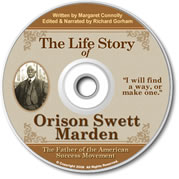- Home
- Self Growth Library
- Orison Swett Marden Chapter XV
Orison Swett Marden Chapter XV
Making And Losing A Fortune
The Life Story of Orison Swett Marden Chapter XV:
It is true that Fortune is a fickle jade. But, in her treatment of Orison Swett Marden, from his seventh to his twenty-first year, she had been quite consistent, having hurled into his life all the "slings and arrows" she could lay hold on.
Then she began to make amends; and, for a number of years after leaving college, the one-time "bound-out" orphan boy stood in the front rank of successful and popular hotel men.
As owner of the Hotel Manisses, Block Island; as proprietor of the Palmer House, Grand Island, Nebraska, and the Midway Hotel, Kearney, Nebraska; and, previously, as manager of the Ocean View Hotel, Block Island, and, later, of several other houses in various parts of the country — at one time he had four hotels in three different states under his control — he had already made considerable money. But, being a thoughtful and enterprising businessman, he believed that he saw an opportunity which would not only enable him to increase his fortune, but would also give him more time for writing.
The latter consideration was what he had most at heart when, in the midst of his rapidly increasing prosperity, he decided to move West. It was the great Kearney boom in the early nineties that directed his steps to Nebraska.
He became proprietor of the leading Inn at Kearney, the Midway, of which he had recently bought the lease and furniture. When he took up his residence there and threw in his lot with the West, all indications pointed toward permanent and widespread prosperity. But so much is dependent upon the success of the crops in the agricultural states, that even the most judicious and farsighted businessmen are often deceived by appearances. One bad season may wipe out the most promising "boom."
When Marden arrived in Kearney, he was delighted with the prospects, no less than with the place itself. It was a beautiful little city with a population of about twelve thousand, and growing rapidly, real estate sales in its vicinity amounting to something like a million dollars a month.
Business was booming, the Midway Hotel became popular, and its proprietor, who in a short time had become a leading citizen - Marden was elected president of the Board of Trade. In fact, during the first year of his residence in Kearney, his business judgment and his hopes were abundantly justified. Fortune smiled on all his undertakings.
In his second year, there came a change. A prolonged and widespread drought destroyed the crops of almost the entire state. They were so burned up by the hot winds that the vast prairies looked as if a fire had swept over them. Business immediately dropped. Doctor Marden, like many others, had invested heavily in real estate at inflated prices; but, when the blow came, they all hoped that the good crops of the ensuing year would redeem the situation.
Nature, however, seemed to be in a sour mood, and business was afforded no chance to recover. Instead of reaping a bounteous crop the following year, the people had no crop to reap. There was a repetition of the terrible drought of the previous year, and it came again the third year. After three successive years of drought and consequent crop failure, the disaster was complete.
Business was wiped out and the boom utterly collapsed. The crowds, which it had been drawn to Kearney, made a grand rush for the East. Those who had a dollar left, or who could by any means borrow or find enough money to pay their fare back, departed silently from the drought-stricken region, not to return.
The whole section was reduced to a pitiful condition. In Kearney, every bank but one had failed. Almost every business man had gone to the wall. No one had any money, and everyone was discouraged.
Unfortunately for Marden, similar conditions prevailed in Grand Island, which was equally affected by the drought. As proprietor of the Palmer House, his fortunes had thus received a double blow in Nebraska.
The luck had turned on "Lucky Marden" with a vengeance — and he was only at the beginning of the change. Fortune was in a vicious mood, and her former favorite became the object of her special fury.
In the midst of the crumbling Kearney boom, the Midway Hotel was burned to the ground. Its proprietor had gone East on a business trip, and on his return from Boston late at night, the house happening to be full, he found his own room occupied and was obliged to take a small one on the fourth floor. Early in the morning he awoke to find the room filled with smoke, which was pouring in under the door. He realized at once that the house was on fire. Jumping up, he saw that the flames had already made such headway that he must flee for his life without even waiting to get his clothes.
In the corridor the smoke was so dense that he was forced to get down on the floor. Keeping his face close to it, in order to avoid being suffocated, he managed to crawl along on his hands and knees to the stairway. Just as he reached it and was rising to his feet to descend, a part of the roof crashed in. A blow from a falling timber hastened his descent, hurling him down the steps to the bottom. He had what seemed an almost miraculous escape from a broken back or some other serious if not fatal injury. As it was, the worst he suffered was a sharp pain in his back and shock to his nervous system.
Immediately before the roof fell in, there occurred one of those extraordinary incidents which seem to figure in all great calamities. They make an interesting study in psychology, — the baffling complexities of the human mind. The occurrence made a vivid impression on him at the time, and as it transpired the result flowing from it caused him no little trouble.
"The moment before I was struck," he said, "I noticed a man standing not far from me in the doorway of his room. I called to him that, if he did not hurry, he might not be able to get downstairs. He answered that he must go back and get his bag. This he did; and, in the meantime, he was cut off from both the stairs and the fire escape. He then got out of his window and held on to the window sill with both hands, trusting that the crowd below would be able to send him relief.
"Never, never, never, never give up."
- Winston Churchill
The wind was blowing a strong gale and the fire approached him rapidly, but he held on until his hands were very badly burned. Then the people shouted to him to drop upon the awning beneath, hoping that this would save him. But it didn't. He went through it as if it had been a piece of paper and was crushed to death on the sidewalk.
"The bag for which the unfortunate man risked his life must have contained something very valuable. But, of course, he had no sooner recovered it than he was obliged to let go of it again, or throw it out of the window; and, as he neglected to do the latter, no one ever learned what its contents were. The secret was swallowed in the flames.
"The Midway Hotel was a large building, and, by an unfortunate combination of circumstances, the fire department was absolutely crippled. It was not used to fighting fires of such magnitude, its captain was disabled, and the wind was blowing so furiously that the men found it impossible to check the flames. They spread so rapidly that practically nothing in the hotel was saved."
The building was only partly insured, and Marden was a very heavy loser. Apart from his financial interest in the business he lost all of his personal effects, his clothing, and some valuable works of art and knick-knacks which he had brought from Europe. But that which he accounted the heaviest loss of all was the destruction of thousands of pages of his book manuscripts and scores of notebooks containing invaluable material for other books.
"Someone told me," he said, "that my manuscripts had been saved, but I found, to my utter horror, that they were all lost and that I did not have even a scratch of a pen to show for all my years of hard work."
Over five thousand pages of manuscripts — the fruit of all the spare time he had been able to snatch from nearly fifteen crowded years of business life — had gone up in smoke. But like Carlyle, when his completed manuscript of "The History of the French Revolution" met with a similar fate at the hands of a servant maid, who mistook it for waste paper, Marden spent no time in bemoaning his loss. With a spirit as indomitable as that of the grim Scottish philosopher, he began at once to reconstruct his work.
"No young man starting in life could have better capital than plenty of friends. They will strengthen his credit, support him in every great effort, and make him what, unaided, he could never be. Friends of the right sort will help him more - to be happy and successful - than much money."
- Orison Swett Marden
Orison Swett Marden Chapter XV , continued...
Having nothing but his nightshirt on when he escaped from the fire, he went down the street to provide himself with necessary clothing. As soon as this had been attended to, he bought a twenty-five-cent notebook, and, while the ruins of the hotel were still smoking, began to rewrite from memory the manuscript of his dream book.
It was an appalling task. One gets some idea of its magnitude when it is recalled the later printed volume contains over four hundred pages, and that the author had not a single note left with which to jog his memory.
Almost penniless, he established himself in a little room over a livery stable owned by a friend. There he lived, ate, worked, and slept, boarding himself for about a dollar a week, and planning, meanwhile, to leave Kearney as soon as he could straighten out his affairs and get sufficient funds to go East.
But the Fates willed otherwise. Kearney was not willing to see him go. Thus, by the way, the people of that once promising western city displayed some of the finest attributes of human heads and hearts.
The Board of Trade, of which he was president, called a public meeting at the Opera House. All the members and the other leading townspeople attended and it was unanimously resolved that, if by any means Marden could be persuaded to remain in Kearney, they would not let him go. They proceeded at once to make good their words; and, in spite of the impoverished condition of the city after its long period of business depression, they succeeded in making up a purse of six thousand dollars.
Every local bank contributed, some of them giving as much as five hundred dollars, and none less than two hundred and fifty. Even the bank to which Doctor Marden owed eighty-two hundred dollars — without endorsement — sent its check for five hundred dollars with its compliments. Finally, the purse was increased from six thousand to eight thousand dollars by contributions from business men in Omaha.
When the purse was presented to him, not as a charity, as the donors said, but as an inducement to him to remain in Kearney and help them to rebuild its fortunes, he felt that he could not refuse them anything they asked. He was quite overcome by their great-hearted generosity. They promised that, if he would stay with them, they would rebuild his hotel; saying that it was to their own interest to do so, for he had given them their first good, clean hotel.
Following this came even more touching gifts, — forty dollars from the High School students, which, they said, they had raised among themselves as an expression of their gratitude for what he had done for the young people of the city, and a check from the leading women, with a letter conveying their appreciation of "a man of such fine character."
Such expressions of genuine love and sympathy from all classes of people in a city in which he had resided but a few years were remarkable. No man evokes such a wave of good feeling even in time of trouble, without having in some way deeply touched the hearts of his fellow men,— without, in some special way, having won their love and gratitude. As a rule, whatever we send out comes back to us in kind.
There was no doubt of the truth of this in his case. He had taken the deepest interest in the welfare of the people of Kearney. He had tried to be a real neighbor to all of them, a neighbor of the Samaritan type, especially to the poor. It had been his custom on Thanksgiving Day, for example, to throw open the hotel to all who were not able to provide themselves with a regular Thanksgiving dinner at home. He even sent carriages for those who lived at a distance or were not able to get to the hotel in any other way; gave them all an excellent dinner, — turkey and "fixins," furnished music, and, in fact, turned the hotel, with all its facilities for entertainment, over to them for the day.
Even the Thanksgiving following the burning of the hotel, when he had nothing with which to help himself, he contrived to secure contributions and make it a real Thanksgiving Day for his poor friends.
He began his preparations several days ahead. Going first to the Mayor, he asked for the use of the City Hall. The Hall — a beautiful new building which had been completed the previous year, — was cheerfully donated for the day. He then secured the cooperation of the newspapers, and asked public contributions of food and clothing. The poor, as always, had suffered most during those lean years when, through the severity of Nature, Kearney had been almost wiped off the map.
But on this Thanksgiving some three hundred of them had at least one joyful day. Attention had also been called to their pressing needs, and there is no doubt that the public spirit of the organizer of the Thanksgiving dinner, together with the generosity of his more comfortably circumstanced fellow citizens, did much to improve their condition for the entire winter.
The editor of the Kearney Daily Hub, M. A. Brown, recalling those early days when he and Marden were the staunchest of friends, says, "My recollection of Doctor Marden is that he was the most perfect gentleman I have ever known.
"All who have accomplished great things have had a great aim, have fixed
their gaze on a goal which was high, one which sometimes seemed
impossible."
"Having risen to a definite position among the philosophers of the
ages, Doctor Marden might have founded a new school of science, or a new
religion, but he found that, in his day, what the world needed most was
not more conflicting creeds, but a welding of all creeds into a law of
daily action — a rule of conduct — a definite schedule of living that
could be as accurately applied to everyday problems as the law of
mathematics itself.
"So, he took philosophy, science, religion, psychology, physics, metaphysics, psychiatrics, and all the 'isms' of the ages, and worked out for the human race a practicable, verifiable, positive law of living that when correctly used, could not fail. This he gave to the world, free and untransformed, uncontrolled by theological doctrines or church organization, unallied with any school of science."
I knew him well during all of his Kearney days. Between us there appeared to be a current of understanding and mutual appreciation. The outstanding characteristic that marked him, in those rather unconventional days, in the bright and breezy metropolis of this 'midway' frontier where East and West had met, and the metropolitan and cosmopolitan were interchangeable and transmutable, was his undeviating courtesy to all men. To him there was no distinguishing mark for prince or pauper. A man was a man who measured to the part.
"In that truly terrible furnace the manuscript of his first book, the transcription of a vision into visible language, was reduced to ashes. The hotel and its furnishings were utterly destroyed. But there was no complaint, no change in his outward manner, no playing for sympathy.
It was then that we learned casually of the loss of the manuscript of the book to be, 'Pushing To The Front’; and, so far as his friends could judge, this loss was real, — so vital, indeed, that other losses did not matter, for they were as the 'trash' that might have been stolen from his generous and open purse."
Purchase The Life of Orison Swett Marden Audiobook

When you purchase The Life Story of Orison Swett Marden audiobook, you also receive a free ebook version of this inspiring classic.
Listening to audio books are the perfect solution for the busy leader. It's easy to learn and grow by listening to inspiring audio books during your morning and afternoon commute; when working out at the gym or hiking outdoors.
Incorporate leadership audio books into your normal routine and make the most of each and every day.
Click to Order. Only $14.95





